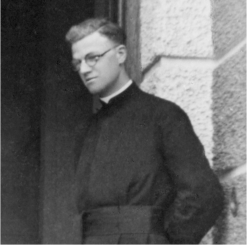In attempt to introduce people to the figure of Alfred Delp (a Jesuit priest and martyr), this blog endeavours to present the writings of Delp that have yet to be published in the English speaking world.
Alfred Delp was born in 1907 in Mannheim, Germany and entered the Society of Jesus in 1926. He was ordained a priest in 1937. In the following year he completed his theology studies in Frankfurt and received his licentiate in theology. Soon after this, he went on to the last stage of Jesuit formation–tertianship.
During this time of intense prayer, Delp discovered a love for the devotion to the Sacred Heart of Jesus. He came to regard the heart of Jesus as the perfect symbol of the triune God’s selfless love for the world. This devotion, I believe, may have enabled him to commit his very own selfless act of the heart–an act that can be described as a total self-surrender.
At the beginning of the Second World War, Delp attempted to do doctoral studies in philosophy at the The Ludwig Maximilian University of Munich. His application, however, was rejected because he was a Jesuit. After this, he joined the staff of Stimmen der Zeit, a Jesuit journal as the editor and writer for social and political matters.
Yet this was not meant to be, too. The Nazis shut down the operations of the journal in 1941. As a consequence, Delp assumed the duties of a pastor at St. George’s church in Munich. It was during this time that Delp entered into the ranks of the Kreisau circle, a group of thinkers from various walks of life, whose purpose was to develop a plan for a post-Nazi Germany.
Due to his participation in the Kreisau circle, Delp was arrested on July 28, 1944. On February 2, 1945, the feast of the Purification of Mary, Delp was executed. During his imprisonment, Delp managed to keep a diary, produce theological reflections, and write letters to his family, friends, and brother Jesuits. With help from friends on the outside, Delp was able to celebrate the Mass in his cell with smuggled bread and wine. The Mass became a source of consolation for both imprisoned Catholics and Protestants in Delp’s cellblock.
The contemplation and examination of his writings and incarcerated life can aid us to understand how one can better make sense of our existence during times of totalitarianism, widespread indifference, or some combination of both!



Reblogged this on Cosmos the in Lost.